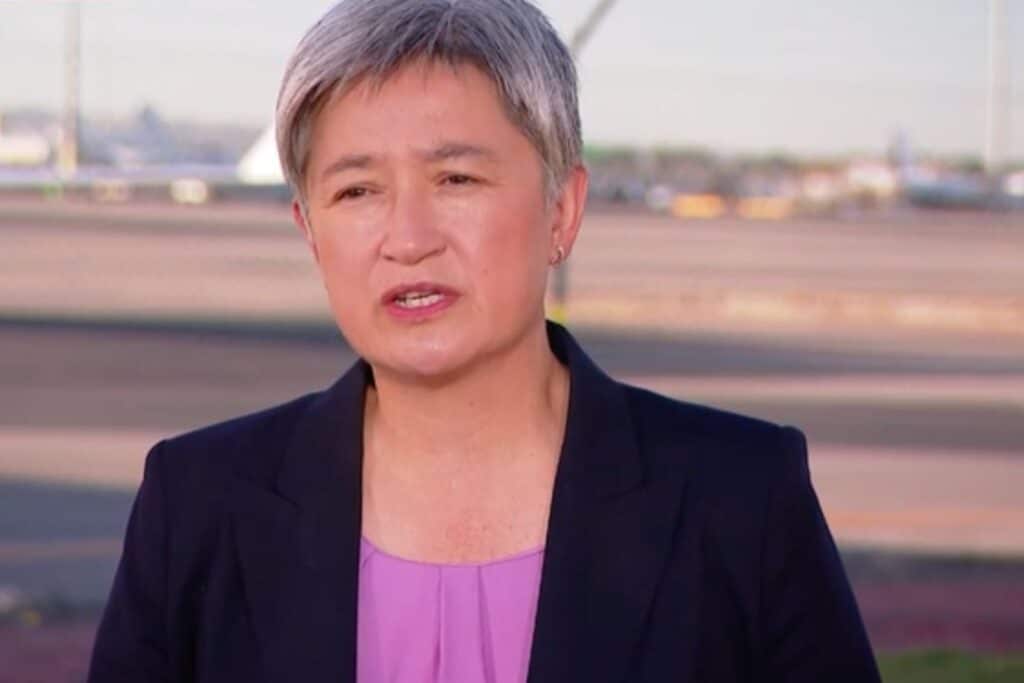Australia’s Foreign Minister Senator Penny Wong has left Australia for her diplomatic trip to the Middle East on Monday, 100 days since Hamas attacked Israel on October 7.
Wong will be visiting Jordan, Israel, the West Bank and the United Arab Emirates on her trip as part of the “international diplomatic effort” to achieve “durable” and “lasting” peace in the war-torn region.
The Foreign Minister gave a press conference at Adelaide airport before her departure on Monday morning.
“Australia is not a central player in the Middle East, but we are a respected voice,” Wong said.
“We are a part of the international diplomatic effort reinforcing the imperative of a lasting peace.”
During her visit, Wong is expected to meet with survivors of Hamas’ attack on Israel on October 7, which killed around 1200 Israeli civilians. She will also be meeting with the families of the hundreds of hostages that are still held by Hamas.
Wong will also be meeting with Palestinian victims of settler violence, according to reports in the media. The move reflects Australia’s growing calls for a “sustainable ceasefire” in Gaza and the position for a “two-state solution” between Israel and Palestine.
“This is a conflict that has been devastating and tragic, and so many Australians with different perspectives are deeply worried about it,” Wong told reporters on Monday.
Wong said she will be travelling to the region sustaining Australia’s priorities of providing “international humanitarian assistance” as well as upholding “international humanitarian law”.
Prime Minister Anthony Albanese’s Labor government holds varying views on the humanitarian crisis in Gaza. In December last year, several Labor MPs and Senators broke rank and signed an open letter calling for a “permanent ceasefire” in Gaza.
The letter was a stronger call than Albanese’s milder response to the crisis. Days before the open letter, Albanese joined Canada’s Prime Minister Justine Trudeau and New Zealand’s Prime Minister Christopher Luxon calling for “urgent international efforts towards a sustainable ceasefire”.
Albanese and Foreign Minister Penny Wong have maintained this point of view as the crisis unfolds, saying a ceasefire cannot be one-sided and calling for Hamas to release the Israeli hostages.
Earlier in December, Australia joined 152 nations at the United Nations General Assembly voting in favour of a resolution calling for a humanitarian ceasefire in Gaza.
Gaza update
It has been 100 days since Hamas attacked Israel on October 7, sparking an extreme response from Israel.
Hamas killed 1200 Israelis in its horrific attack and took hundreds of Israeli civilians as hostages, with some hostages still remaining at the hands of Hamas.
In response, the Israeli Defence Force (IDF), on behalf of the Israeli government, has launched a devastating bombing and military campaign, attacking the 360 square kilometre strip home to 2.1 million Palestinians for the last 100 days.
The estimated death toll, according to international media outlet Al Jazeera, currently sits at nearly 24,000, with around 10,000 of these deaths being children.
More than 60,000 or around 3 in 100 people in Gaza have been injured in Israel’s attack.
According to Al Jazeera, 100 journalists and media workers have been killed reporting on the conflict. This is one journalist killed every day.
The 100-day attack on Gaza has disproportionately affected women and children, particularly new mothers and newborns. More than 180 babies are born in Gaza every day, and there are roughly 5,500 women due to give birth in the coming weeks. The overcrowded and under resourced hospitals in Gaza mean mothers and newborns cannot receive the care they need, placing them in significant danger.
Food insecurity is also at an all-time high, with nine in ten people going 24 hours without food every day.
South Africa v Israel at the ICJ
In late December, South Africa brought a case to the UN’s International Court of Justice, accusing Israel of committing acts of genocide in its military response in Gaza.
The case refers to the 1948 Genocide Convention’s definition of “genocide”, where Article 2 of the Convention defines the term as committing acts with “intent to destroy, in whole or in part, a national, ethnical, racial or religious group”.
Acts of genocide, according to the convention, including: killing members of the group; causing serious bodily or mental harm to members of the group; deliberately inflicting on the group conditions of life calculated to bring about its physical destruction in whole or in part; imposing measures intended to prevent births within the group; forcibly transferring children of the group to another group.
Both South Africa and Israel are parties to the Convention. Australia is also one of the 130 member states who are parties to the Convention.
On December 29, South Africa brought its case against Israel to the ICJ, the UN legal body in place to adjudicate on issues between member states. The court’s rulings are binding and cannot be appealed by member states. However, it is up to the UN Security Council to enforce rulings by the ICJ.
There are 15 judges in the ICJ who serve nine-year terms, elected through the General Assembly and the Security Council. Currently, Judge Hilary Charlesworth from Australia serves as a judge for the ICJ, one of four women judges.
Initial proceedings of the South African v Israel case at the ICJ began on 11 January and are expected to last for a few weeks. However, the main case could take up to four years.
South Africa is accusing Israel of committing acts of genocide and demanding urgent international action to be taken in order to prevent further crimes from happening in Gaza.
Israel has called the case “preposterous” and will argue their military response is in self-defence.


